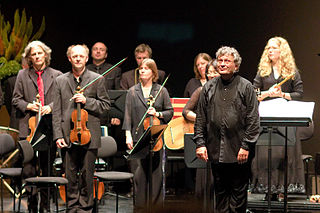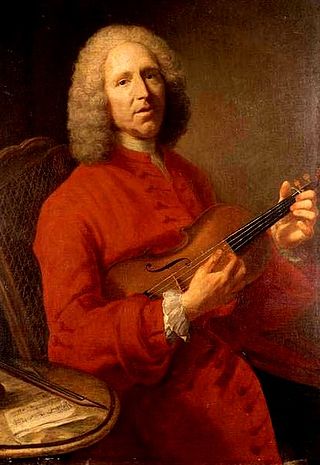
Odile Bailleux (born 30 December 1939) is a French harpsichordist and organist.

Odile Bailleux (born 30 December 1939) is a French harpsichordist and organist.
Born in Trappes, Odile Bailleux studied music at the Versailles conservatory and the École César Franck in the organ class with Jean Fellot [1] and Édouard Souberbielle. After she participated in 1964 in the International Academy of the Organ in Saint-Maximin-la-Sainte-Baume, she left in 1969 in Frankfurt to work with the organist Helmut Walcha. She is the substitute for Antoine Reboulot at the grand organ of the Abbaye de Saint-Germain-des-Prés (Paris) and since 1973 she holds the same post with André Isoir. She has been teaching the organ since 1989 at the conservatory of Bourg-la-Reine. She is the titular of the Grand Organ of the Notre-Dame-des-Blancs-Manteaux church.
As a harpsichordist she has been performing the continuo in the group Musique-Ensemble and La Grande Écurie et la Chambre du Roy since 1977.

René Jacobs is a Belgian musician. He came to fame as a countertenor, but later in his career he became known as a conductor of baroque and classical opera.
Philippe Huttenlocher is a Swiss baritone.
Paul Lawrence Vincent Esswood is an English countertenor and conductor. He is best known for his performance of Bach cantatas and the operas of Handel and Monteverdi. Along with his countrymen Alfred Deller and James Bowman, he led the revival of countertenor singing in modern times.
The Lamentations of Jeremiah the Prophet have been set by various composers.

Véronique Gens is a French operatic soprano. She has spent much of her career recording and performing Baroque music.

Le temple de la Gloire is an opéra-ballet by Jean-Philippe Rameau with a libretto by Voltaire. The work was first performed in a five-act version on 27 November 1745 at the Grande Écurie, Versailles to celebrate the French victory at the Battle of Fontenoy. It transferred, unsuccessfully, to the Paris Opéra on 7 December 1745. A revised version, in a prologue and three acts, appeared at the Opéra on 19 April 1746.
John Joseph Elwes, is an English tenor singer.

Jean-Claude Malgoire was a French oboist and later conductor.
Agnès Mellon is a French soprano who specializes in baroque music.
La Grande Écurie et la Chambre du Roy is a French musical ensemble, based in Tourcoing, France, that performs using period instruments. The group was founded in 1966 by Jean-Claude Malgoire and led by him until his death in April of 2018. Alexis Kossenko, flutist and conductor, was named music director of the group in October 2019 While the ensemble has performed a wide repertoire from a variety of musical periods, the group has drawn particular acclaim for their performances of baroque music and the works of Wolfgang Amadeus Mozart. The group has toured 5 continents and has made more than 100 recordings. The ensemble's recording of Antonio Vivaldi's Motezuma was awarded the Victoires de la musique classique in 1992. Their recording of Vivaldi's Vêpres pour la Nativité de la Vierge won the Grand Prix du Disque. The ensemble is supported financially by the France's Ministry of Culture and the city of Tourcoing.
Henri Ledroit was a French counter-tenor, the first in France of the modern revival in that voice range. Originally training to be a baritone in 1972 he met Alfred Deller and decided to train as a countertenor. He made many of the earliest recordings of pieces later to become standards of baroque countertenor repertoire - for example his Orphée Descendant aux Enfers H 471 of Marc-Antoine Charpentier.

Pascal Bertin is a French countertenor.
Alexis Kossenko is a French contemporary flautist, conductor and musicologist.
Philippe Cantor is a contemporary French bass-baritone.

Bruno Boterf is a contemporary French tenor, specialising in Baroque and early music.
The Chœur d'Oratorio de Paris is a French mixed choir, funded in 1989 by Jean Sourisse.
Florence Malgoire was a French classical violinist, pedagogue and conductor.
Bernard Deletré is a French operatic bass-baritone.
Bernard Tétu is a French choir and orchestra conductor. He regularly conducts numerous symphony orchestra and ensembles of contemporary and early music: the Orchestre de Bordeaux, the Orchestre National de Lyon, the Orchestras of Auvergne, Brittany and Provence-Côte d'Azur, La Grande Écurie et la Chambre du Roy, the Orchestra of the Opéra national de Lorraine, the Philharmonie de Lorraine... He has also conducted orchestras abroad.
Olivier Schneebeli is a French conductor and choirmaster, as well as music teacher, known for his work on Baroque music. He was named to the Legion of Honour in 2021.